Price Fixing Probe Scorecard
Undoubtedly the big story
that continues to reverberate around the world is the ongoing price
fixing scandal. Already one high profile air cargo executive Bruce McCaffrey
of Qantas will take the perp walk into the slammer to do time (eight
months) after being convicted in the USA. Here is a scorecard to date
and some further thoughts as to what possibly might lie ahead.
One thing is apparent right away.
At a time when aviation is enduring run away oil prices, law enforcement
for some reason has descended upon almost every airline and may be checking
every airway bill.
Nobody ever said air cargo was supposed
to be easy.
Price Fixing By The Numbers |
Ranking* |
Airline |
Alliance |
Price Fixing Status** |
| 1 |
FedEx |
|
|
| 2 |
UPS |
|
|
| 3 |
Korean |
SkyTeam |
USD 300 million fine |
| 4 |
Lufthansa Cargo |
Star Alliance |
Reported plea deal; immunity and USD 85 million
fine |
| 5 |
Singapore Airlines |
Star Alliance |
Probe |
| 6 |
Cathay Pacific |
One World |
Probe |
| 7 |
Atlas Air |
|
|
| 8 |
China Airlines |
|
|
| 9 |
Air France |
SkyTeam |
Probe |
| 10 |
Eva Air |
|
|
| 11 |
Cargolux |
|
Investigated; took USD 155 Provision |
| 12 |
Japan Airlines |
OneWorld |
USD 110 fine |
| 13 |
British Airways |
OneWorld |
USD 300 million fine |
| 14 |
KLM |
SkyTeam |
Probe |
| 15 |
Emirates |
|
|
| 17 |
Northwest Airlines |
|
|
| 18 |
American Airlines |
OneWorld |
Information requested by authorities |
| 20 |
United Airlines |
Star Alliance |
Information requested by authorities |
| 21 |
Polar Air |
|
Information requested by authorities |
| 23 |
Asiana Airlines |
Star Alliance |
Probe |
| 25 |
Qantas |
OneWorld |
USD 61 million fine; US executive sentenced to
jail time and USD 20,000 fine |
| 29 |
Delta Airlines |
SkyTeam |
|
| 30 |
Lan Chile |
OneWorld |
Probe |
| 36 |
Air Canada |
Star Alliance |
Investigated; took USD 125 million provision |
| 53 |
SAS |
Star Alliance |
Investigated |
* The World's Top 50 Cargo
Airlines-Air Cargo World
** According to press reports |
| Alliance |
Members World Cargo Rankings |
Total Fines/Provisions |
| Star Alliance |
4; 5; 20; 23; 53; 36 – LH; SQ; UA; OZ; SK;
AC |
$85 / $125 |
| SkyTeam |
3; 9; 14; 17; 29 – KE; AF; KL; NW; DL |
$300 |
| OneWorld |
6; 12; 13; 18; 25; 30– CX; JL; BA; AA; QF,
LA |
$471 |
| |
|
|
| Non-allied |
|
|
| Cargolux |
11 CV |
/$155 million |
Star Alliance members seem
to have gotten off the cheapest when it comes to actual fines, followed
by SkyTeam with 1.5 times the fines plus provision taken and lastly
– or actually the top of the heap – OneWorld which has been
hit the hardest at 2.25 times the fines compared with the Star Alliance
airlines.
One can only wonder what this means in
terms of market share and competition among the alliances and their
respective members?
It is also interesting to look at these
airlines in terms of combination carriers, a combination carrier with
pure freighters and all-cargo airlines to complete the picture:
| Airline |
Combination Carrier |
Combination Carrier with
Freighters |
All-Cargo |
| LH |
|
|
|
| SQ |
|
|
|
| UA |
|
|
|
| OZ |
|
|
|
| SK |
|
|
|
| AC |
|
|
|
| AF |
|
|
|
| KL |
|
|
|
| NW |
|
|
|
| DL |
|
|
|
| KE |
|
|
|
| CX |
|
|
|
| JL |
|
|
|
| BA |
|
|
|
| AA |
|
|
|
| QF |
|
|
|
| CV |
|
|
|
The equipment used by each
category offers clues about the shippers, logistics providers and freight
forwarders they serve and the type of cargo each attracts and can best
service.
One question is whether this is a case
of over-zealous prosecution by the U.S. and EU authorities similar to
how former New York State Governor Elliott Spitzer used to go after
Wall Street institutions?
No one implies total innocence nor should
breaking the law be condoned.
Antitrust is a very serious matter.
The light top cargo executive attendance
list at CNS with many executives obviously refusing to travel to the
U.S., could be a sign that right now even non-U.S. airlines’ legal
departments are well versed in the provisions of the Sherman Antitrust
Act, especially the sentencing fines, 18 U.S.C. §§ and Imprisonment,
18 U.S.C. §§.
The price fixing matter is so sensitive
and toxic and the atmosphere so palpably tenuous that it will not be
discussed, on or off the record.
A reasonable conclusion may be that the
matter is far from just going away, in fact currently price fixing is
still a rather fluid matter with the second shoe about to drop at any
moment.
Two things come to mind in this context
that emphasize how front and center this issue has become.
Back in the days of government-owned airlines,
the playing field wasn’t exactly even – publicly-held airlines
had been competing with airlines with access to government funding.
The situation evolved over time but it took many years to achieve a
balance.
What is the impact of the fuel surcharge
issue on today’s airlines from a competitive perspective?
Do all airlines pay the same price for
fuel?
If they don’t, there are winners
and also rans - to the tune of billions of dollars.
Is there a level playing field in all
of this?
Web-touring cargo home pages of airlines
indicate fuel surcharges are applicable and applied industrywide, whether
an airline’s home base is in an oil producing or oil consuming
country.
To make all of these headline-grabbing,
price fixing allegations and fines credible and transparent, we imagine
it is within the purview of the U.S. DOJ or the EU’s to obtain
evidence of actual fuel prices paid in the respective home countries
by airlines holding authority to operate into the U.S. and in any EU
member country.
In an atmosphere of uncertainty this kind
of transparency would not only lend some credence to all this cloak
and dagger stuff going on pertaining to price fixing, it also would
put a more realistic light on the anti-trust cause and put the issue
into context.
The other day I received a phone call
from a person claiming to be an “investigator for a New York law
firm”; I was told the call was because I had worked for IATA and
what I knew about its role in price setting.
Clearly, the uninitiated are getting involved—
people who don’t know the first thing about the industry and IATA,
and who don’t really care about facts smell blood in the water!
EU and U.S. authorities vigorously hound
airlines alleged to have conspired of fixing fuel surcharges, yet the
same level of scrutiny and prosecutorial fervor strangely eludes the
world’s most notorious and germane cartel – OPEC.
So while fuel price fixing by OPEC goes
on unfettered with a vastly more devastating global economic impact,
going after airlines which are extremely vulnerable to regulatory regimes
is all the rage because it’s easier.
Your move.
Ted Braun
info@tedbraun.com.
Continental Cargo
Carbon Copy
In a world where
many are being judged not by the strength of their character
but by the content of their carbon footprint, an airline has
taken the unusual position of not being bigger, to be better—rather
measured, to be responsible.
Continental Airlines Cargo said
that it is the first North American airline with a Cargo Emissions
Calculator.
So added to the Breathalyzer on
the way home, here comes a way to check out the carbon footprint
of shipments.
 What’s
more, CO Cargo says this innovative tool that the airline is
introducing with Sustainable Travel International (STI) “provides
easy origin and destination entry, and the voluntary option
to contribute to carbon offsets for the itinerary by enabling
forwarders to quickly determine the greenhouse gas impact of
Continental flights, in their logistics chain.” What’s
more, CO Cargo says this innovative tool that the airline is
introducing with Sustainable Travel International (STI) “provides
easy origin and destination entry, and the voluntary option
to contribute to carbon offsets for the itinerary by enabling
forwarders to quickly determine the greenhouse gas impact of
Continental flights, in their logistics chain.”
“Even with the most fuel-efficient
fleet among U.S. network carriers, we replaced more than 20
older Classic 737s this year with Next Generation 737-900ERs
and 737-800s, said Jack Boisen, Vice President Cargo Division.
“We have more than 100 new
advanced-technology, fuel-efficient Boeing aircraft on order.
Why hide from carbon issues? We are going to take a leadership
position and make it as easy as possible for forwarders to work
with us.
“The carbon offsetting option
is part of a company-wide commitment to environmental responsibility.
“Continental has achieved a 35 percent reduction in greenhouse
gas emissions and fuel consumption over the past 10 years, and
is the only major U.S. carrier using sustainable biofuels,”
Mr. Boisen said.
Now we wonder about airborne-developed
green house gasses inside the tube on the main deck?
Stay tuned.
Geoffrey
|
UPS
Opens Shenzen
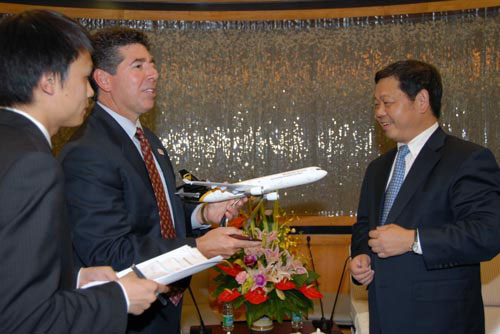 Dan
Brutto, presents a UPS MD-11 model to Mayor Xu Zengheng of Shenzhen. Dan
Brutto, presents a UPS MD-11 model to Mayor Xu Zengheng of Shenzhen.
|
UPS’ decision of moving its intra-Asia
air hub from the Philippines to South China’s Shenzhen rather
than Guangzhou, signifies that Shenzhen finally wins a round in the
competition with its neighbor.
Closely located in China’s Pearl
River Delta, Shenzhen and Guangzhou “compete against each other
intensely, due to the overlap of their location and their positioning
in air cargo,” Li Lei, Analyst of CITIC, said to Flying Typers.
Without UPS’ deal, Shenzhen would
have lagged behind Guangzhou in terms of cargo volume as Guangzhou’s
cargo volume will be boosted when FedEx plans to open its Asia-Pacific
hub there this October.
According to the agreement signed on May
21 in Shenzhen between UPS and Shenzhen Airport Group, UPS will spend
USD$180 million to build a new sorting hub in Shenzhen with five times
the capacity of the existing hub in Philippines.
"Shenzhen's strategic location will
provide significant advantages, allowing UPS to better serve the growing
Asian markets along these rapidly expanding trade lanes," said
Dan Brutto, president, UPS International. "For example, we expect
a full day's improvement in transit time on almost 200 city pairs once
this hub opens.”
The Shenzhen hub, expected to total about
89,000 square meters in size (almost 1 million square feet), will include
an express customs handling unit, sorting facilities, cargo handling
and cargo build-up areas and ramp handling operations. It will be capable
initially of processing up to 18,000 pieces per hour - compared to the
existing 7,500 pieces per hour in the Philippines - but can be easily
expanded to a capacity of 36,000 pieces per hour.
Mr. Xu Zengheng, Mayor of Shenzhen, states
during the signing ceremony: “the modern logistics industry centered
on airport and seaport is one of the four Pillar industries of Shenzhen,
“And Shenzhen Government will provide
the utmost support to UPS’ development in Shenzhen.”
Mr. Huang Chuanqi, President of Shenzhen
Airport Group, said: “UPS’ air hub in Shenzhen will effectively
connect South China region and Hong Kong through a ground transportation
network, developing Shenzhen into a real cargo hub.”
David
Midex Goes
SkyChain Lite
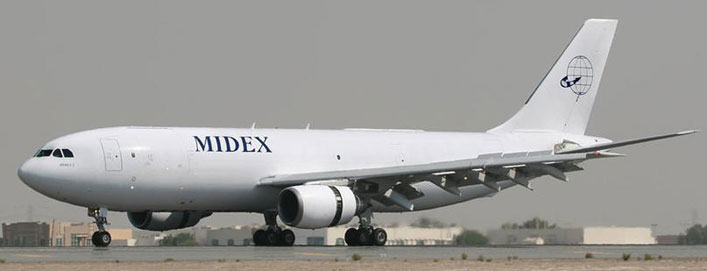
Dubai-based Midex Airlines
launches itself and also is the first customer for SkyChain Lite, the
new end-to-end cargo reservation and business management solution offered
by Mercator.
Midex is the first customer for the new
hosted version of SkyChain, the new generation cargo management system
at Emirates SkyCargo that replaced 23 legacy systems with a single integrated
set of applications by operating on a new technology platform.
SkyChain Lite is a service designed for
start up or small carriers.
Jassim Al Bastaki, Director General, Midex
Airlines, said:
“We were not looking for a supplier
but for a partner, and we believe we have found a best-in-class solution
with Mercator.”
Midex Airlines, a division of Midex International, is the only wholly
dedicated cargo airline for the UAE.
It operates a fleet of six, 45-ton capacity
Airbus A300 (F) and one Boeing B747-200F and is planning to launch scheduled
services, initially linking destinations in France, India, Bangladesh,
Turkey, Sri Lanka, Pakistan and Lebanon from its base at Al Ain International
Airport.
Midex says its operations are geared to
high value-added niches and products.
Cargo Stars
At Air Show
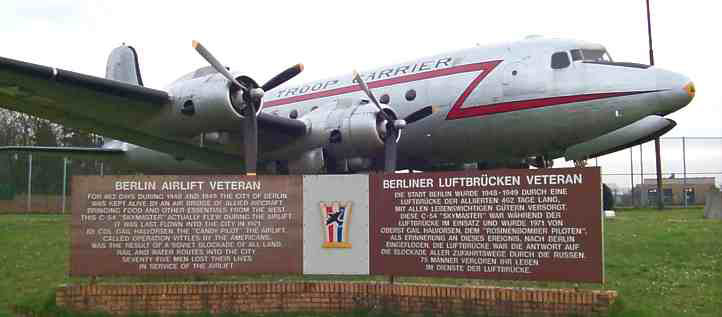
They made more than
33,000 Messerschmitt ME 109s in Germany during World War II and
one of that number, a restored aircraft, ran off a runway and
ended up somewhat the worse for wear (although the pilot escaped
without harm) in some grass at Schönefeld Airport as The
Berlin Air Show kicked off yesterday.
Here again is the world’s
oldest air event, the first one having been held in 1909.
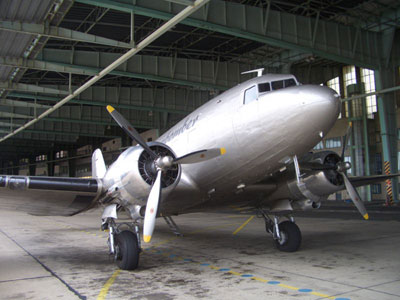 But
yesterday it was all about 1948 and remembering the 60th anniversary
of The Berlin Airlift. But
yesterday it was all about 1948 and remembering the 60th anniversary
of The Berlin Airlift.
Schönefeld may have been on
the other side of the Iron Curtain as the Soviets closed down
western over the road access blockading Berlin, June 22,1948,
but yesterday the place was ground zero for some nostalgia about
the birth of modern air cargo.
At the ceremonies German Chancellor
Angela Merkel gave "special thanks" to the United States
and Britain for supplying Berlin with coal and food during the
Soviet blockade as several veterans of the epoch 24/7 nearly year-
long rescue mission looked on.
"History could have turned
out differently without the extraordinary effort to keep the Western
outpost supplied,” Chancellor Merkel said.
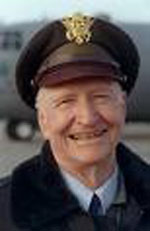 Interestingly Russia leads the way
at this year's Berlin Air Show, with a record number of companies
exhibiting, and buyers thronging the stands.
Interestingly Russia leads the way
at this year's Berlin Air Show, with a record number of companies
exhibiting, and buyers thronging the stands.
This year India has pride of place
as the fair's partner nation, with Naresh Goyal, Chairman of Jet
Airways on hand to accept the latest Airbus passenger aircraft
destined to join the India-based carrier’s fleet.
But it is The Berlin Airlift that
is capturing hearts, and an ancient DC3 cargo aircraft that sputters
to life each day and rumbles down the runway and performs a symbolic
fly-over, recalling a time when Berlin hung by a thread and air
cargo came to the rescue.
Among the 300 aircrafts at the show
are a new Airbus A330F, an A380, a giant AN 124, and the C5 Galaxy.
The public will be admitted to the
event on Friday.
Most poignant this week in Berlin
is Col. Gail Halverson, "The Candy Bomber" of the Berlin
Airlift.
Now 87, Halverson who still flies
was the man who dropped tiny parachutes to the children of West
Berlin in 1948 during the Berlin Airlift and now travels the world
reenacting his original candy bombings from a small private plane.
“I just love helping people
and making friends for America,” Col. Halverson said.
Geoffrey
|
|



